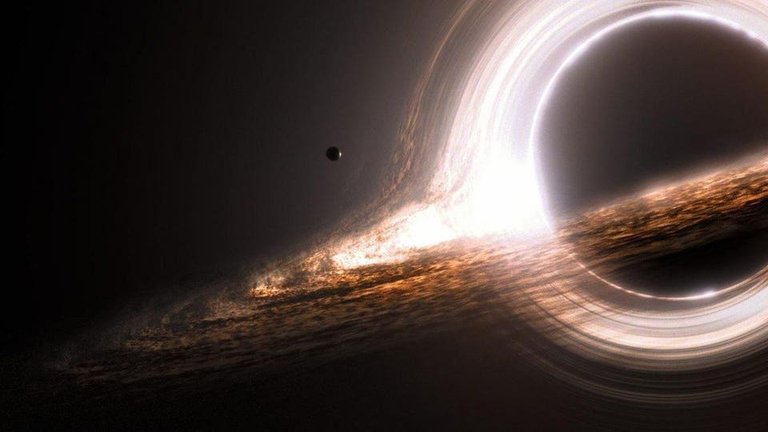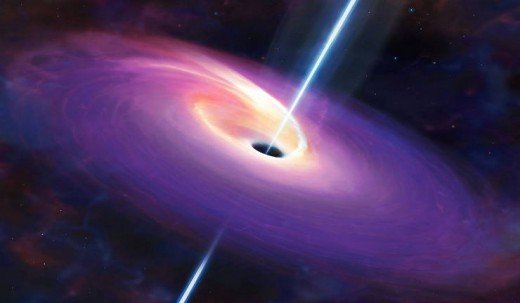What really is a black hole?
A black hole is a celestial body, which has a very high gravitational pull, and nothing, not even light can escape it. The escape velocity is so high that not even light can achieve that speed. And as most of you will know, nothing known can travel faster than light. So, indirectly, nothing can escape a black hole, once it crosses the Event Horizon. Black holes are quite dangerous for our existence. These celestial bodies can swallow everything that comes into their path. The sizes of the black holes may vary, depending on the size of the stars from which they formed. Some theorists believe that there is a massive black hole at the center of our galaxy, but these are just theories. Nobody knows for sure what is there, at the very center. If a black hole nears the Earth, then nothing can stop us from our fate. That’s just a matter of speech, but in the future, we can really behold this situation. So, to study black holes, we will see how they are formed, in this article.

How does a black hole comes into existence?
For a black hole to get formed, certain requirements should be met. The main thing that matters is the size of the parent star, from which the black hole is formed. As most of you may know that stars sustain themselves by nuclear fusions inside their core, which requires hydrogen as a fuel. These nuclear fusions produce heat and light energy, which balances the pressure on the outside and inside. But, once the star consumes all of the hydrogen, then it has nothing to burn. Hence, the pressure inside the star lowers, and the star collapses under its own gravity to a single point, with critical density. The gravitational pull is so high that, as stated already, even light isn’t able to escape. To get a black hole, the mass of the star should be about 200 times bigger than that of our Sun. If the star is smaller than that, the electron balances the pressure, and the stars turn into a white dwarf (our sun would be one of them, after billions of years). Once the bigger star consumes the hydrogen, it starts collapsing, and the outer layer erupts to form a supernova. If the core remaining is about 2.5 times the mass of the sun, then there is nothing that can stop the star from becoming a black hole. The star collapses continuously, under its own gravity, and the core collapses too. The collapsing continues, and a point is reach when the volume of the star is mathematically zero, and it has a critical density. The mass contracts into an infinitely small point, which is called a singularity. Due to the massive density, the gravitational pull reaches such a point, that it is virtually impossible to reach the escape velocity, which is the velocity required to escape a body’s sphere of influence. I know that you will now ask; if nothing can come back out of a black hole, then why does it radiate X-rays and gamma rays. The answer is that, before reaching the Event Horizon, the matter orbits the black hole in an accretion disk, which is a belt of hot gas. If the matter is dust or gas, it experiences friction, and the orbital energy of the gas is converted into heat energy. The closer is the matter to the black hole, the more it will heat up. This can continue until it heats up to thousands and billions of degrees, thus producing X-rays and gamma rays. The black holes sometimes emit high-speed jets of matter too. Scientists have known that these jets contain electrons, but they recently figured out that iron and nickel is also present in these jets. These jets are caused due to very heavy atoms. And to prove this theory, they found that an iron atom is very massive, as compared to the formerly hyped positrons, which were antimatter brothers of positively charged atoms. The accretion disk is found to be responsible for providing the matter for these high-speed jets. From where does these jets from? Well, the answer to this question has not been found out till now, but the chances are that they will, by the end of the decade. So, that was the journey, from a star to a black hole.

Will entering a black hole be fun?
A question that has always screwed astronomers is; what will happen if we enter a black hole? Many theories, as an answer to this question, exist. Some say that if you enter a black hole, you will be pulled deeper and deeper, until you hit the singularity. And then, in a moment, you will vaporize into nothing. Some other people say that if you enter a black hole, the gravitational difference between your foot and your head will be so high, that you will become human spaghetti. You will keep stretching until you too reach an infinitely small point, and get vaporized. And one of the most continuously intriguing theories is that black holes can be used for time travel. Some people refer it as a joke, but some others take this seriously.
Can black hole really help in time travel?
As most of you would know, gravity affects everything, from light to time. Yes, gravity can affect time also. An experiment conducted by Pound and Rebka shows that if a clock is put near to a very strong gravitational field, it will tick more slowly. In the same way, black holes can be ideal for the ‘very strong gravitational field’. If you start nearing a clock towards the Event Horizon, you will see that one second of the clock would start increasing to days, months and years. But, for the clock, it will still be ticking at one second interval! This happens because the gravity is affecting the time. Suppose you enter a black hole, you will surely be vaporized. But, if it’s very, very massive one, then the force near the Event Horizon will be very small. And if you are able to survive that force, and escape just before reaching the Event Horizon, you will find yourself jumped up some years, or even a century. This has not been proven yet, but the facts and figures are so accurate that it cannot be wrong. If this method works, we would be able to travel into the future only. There is no way you can go to the past; the nature is against traveling to the past. The universe above our head is vast, and pretty confusing. There is no way to know for sure what will happen next. But, thanks to the super-intelligent folks working down here to make sure that every mystery is solved. This article is dedicated to all of them.
Thanks for reading!!
This post was upvoted by Steemgridcoin with the aim of promoting discussions surrounding Gridcoin and scientific endeavors.
This service is free. If you want to help the initiative, feel free to upvote this comment or click here to learn how to delegate SP.
Have a nice day.
Disclaimer: This account is not associated in any shape or form with the official gridcoin devs team.